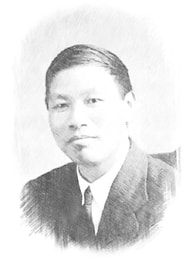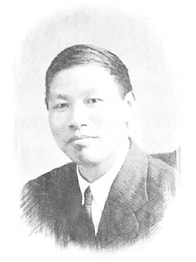Wachman Nee

Watchman Nee was born to a Christian home in China in 1903.(Born: November 4, 1903, Guangdong Died: May 30, 1972, Guangde, Xuancheng, Chinain) However, as an unsaved, educated young man, he considered Christian preaching to be the lowest occupation on earth. He was very intelligent and capable, and he had big plans for his future.
In 1920, when Watchman Nee was 17 years old, a well-known evangelist came to preach the gospel at his parents’ church. As a result, many in the congregation believed in the Lord and were saved. But although Watchman Nee was in attendance and was moved by the gospel message, he wasn’t immediately saved. He realized that receiving Christ as his Savior also meant receiving Christ as his Lord and would require him to serve the Lord for the rest of his life. In addition to carrying out his ministry through writing and publishing, Nee also spoke in various places in China. These messages were then printed as books. In 1938, he traveled to Europe and gave messages there that eventually were collected and published as The Normal Christian Life.
It was clearly manifest that Nee was a particular gift from God to the Body of Christ. He ministered from the Word of God in a country that had long been deprived of both the basic and deeper truths revealed in God’s Word.
Through Watchman Nee’s ministry, the Lord raised up thousands of believers and hundreds of churches throughout China.
In 1920, when Watchman Nee was 17 years old, a well-known evangelist came to preach the gospel at his parents’ church. As a result, many in the congregation believed in the Lord and were saved. But although Watchman Nee was in attendance and was moved by the gospel message, he wasn’t immediately saved. He realized that receiving Christ as his Savior also meant receiving Christ as his Lord and would require him to serve the Lord for the rest of his life. In addition to carrying out his ministry through writing and publishing, Nee also spoke in various places in China. These messages were then printed as books. In 1938, he traveled to Europe and gave messages there that eventually were collected and published as The Normal Christian Life.
It was clearly manifest that Nee was a particular gift from God to the Body of Christ. He ministered from the Word of God in a country that had long been deprived of both the basic and deeper truths revealed in God’s Word.
Through Watchman Nee’s ministry, the Lord raised up thousands of believers and hundreds of churches throughout China.

Writing to the Corinthians, Paul said, "To boast is necessary, though indeed not expedient" (2 Cor. 12:1). He admitted that it was "not profitable" (Gk.) for himself to write what he wrote in 2 Corinthians 12. But for the sake of others he had to do it; he was obliged to speak of "visions and revelations of the Lord." .............Did Paul disclose all his revelations? Far from it. He wrote, "I know a man [who is himself] in Christ, fourteen years ago (whether in the body I do not know, or outside the body I do not know; God knows) such a one was caught away to the third heaven" (v. 2). He did not divulge this experience until fourteen years later. What depth there was in Paul! It would be a wonder if we could hide away something we received from God for seven years. But for fourteen years Paul never divulged his experience; for fourteen years God’s church knew nothing of it; for fourteen years not one of the apostles had heard of it. Paul’s roots were deep beneath the soil. --Wachman Nee
“A drowning man cannot be saved until he is utterly exhausted and ceases to make the slightest effort to save himself.” ― Watchman Nee, The Normal Christian Life

- One -- When a sinner comes to see his need for forgiveness, he tries to imagine how it is to be accomplished. The sinner's concept is 'I give you work, you give me wages.' He tries to come as an employee, rather than as a son.
- Two -- God lavishes His riches on His children. His wealth never runs out.
- Three -- When God saves a sinner, He celebrates and rejoices.
- Four -- The elder son wanted the father to give him joy. The father's desire was that the son come in and rejoice with him. God never gives anything to anyone just for that one to enjoy: He always wants men to enjoy together with Him.
- Five -- When the father kissed him, the son knew he was forgiven. He sat at the table and gave joy to his father. Worship comes out of joy in the Lord.
- Six -- God has given us many gifts. What a painful loss it is for Him if we run off and waste them! But how great is His joy when we at last return and that which He has lost is found.
 Wachman Nee
Wachman Nee
“When one tries to increase his knowledge by doing mental gymnastics over books without waiting upon God and looking to the guidance of the Holy Spirit, his soul is plainly in full swing. This will deplete his spiritual life. Because the fall of man was occasioned by seeking knowledge, God uses the foolishness of the cross to "destroy the wisdom of the wise.”
― Watchman Nee
― Watchman Nee
“All satanic works are performed from the outside inward; all divine works from the inside outward.”
― Watchman Nee
― Watchman Nee
 Wachman Nee
Wachman Nee
“God does not blame me for being an individual, but for my individualism. His greatest problem is not the outward divisions and denominations that divide His church, but our own individualistic hearts.”
― Watchman Nee, The Normal Christian Life
“Man's thought is always of the punishment that will come to him if he sins. God's thought is always of the glory man will miss if he sins. God's purpose for redemption is glory, glory, glory.”
― Watchman Nee, The Normal Christian Life
― Watchman Nee, The Normal Christian Life
“Man's thought is always of the punishment that will come to him if he sins. God's thought is always of the glory man will miss if he sins. God's purpose for redemption is glory, glory, glory.”
― Watchman Nee, The Normal Christian Life
 Wachman Nee
Wachman Nee
This is our conduct on the positive side. If we want to renew our nous, or have our nous renewed frequently, we must put on the new man in our experience. This also is an act of the will. What does it mean to put on the new man? Our new man, which is according to God’s image, was created in righteousness and holiness of the reality. In other words, the characteristics of the new man are righteousness and holiness of the reality. Righteousness is God’s way; holiness is God’s nature. Concerning God, we can speak of three aspects: (1) glory, referring to God Himself; (2) holiness, referring to God’s nature; and (3) righteousness, referring to the way God acts. We were created according to God’s image, but this is limited to the aspects of God’s righteousness and holiness; we cannot be like God in His glory, since glory has to do with His Godhead. We cannot be part of this. But we have God’s righteousness and holiness. Therefore, if a believer wants to be like God, he should let God’s nature deal with him in God’s way. Today how many believers have deep feelings about sin? I am ashamed to say that my feeling about sin is not deep enough. Miss M. E. Barber deeply understood sin and God’s holiness. Usually one only senses pride or jealousy but does not know what pride and jealousy are. But if you went to Miss Barber, you would have a feeling that you otherwise would not have had. She hated sin the most, and she dealt with sin the best. She dealt with herself very strictly. As a result, she was also extremely straightforward with others. The minute one came into her presence, he realized what pride and jealousy are. She truly knew God. This is why I say that many times we cannot learn truths from a man’s preaching, but we can learn from the truth he practices.
- Watchman Nee; The Renewing of the Mind
- Watchman Nee; The Renewing of the Mind
“Man may think human intellect and reasoning are almighty, that the brain is able to comprehend all truths of the world; but the verdict of God's Word is, "vanity of vanities.” ― Watchman Nee
 Wachman Nee
Wachman Nee
You believe in the death of the Lord Jesus and you believe in the death of the thieves with Him. Now what about your own death? Your crucifixion is more intimate than theirs. They were crucified at the same time as the Lord but on different crosses, whereas you were crucified on the selfsame cross as He, for you were in Him when He died. How can you know? You can know for the one sufficient reason that God said so. It does not depend on your feelings. If you feel that Christ has died, He has died; and if you do not feel that He has died, He had died. If you feel that you have died, you have died; and if you do not feel that you have died, you have nevertheless just as surely died. These are divine facts. That Christ has died is a fact, that the two thieves have died is a fact, and that you have died is a fact also. Let me tell you, You have died! You are done with! You are ruled out! The self you loathe is on the Cross of Christ. And "he that is dead is freed from sin" (Romans 6:7 Amplified). This is the Gospel for Christians.
Our crucifixion can never be made effective by will or by effort, but only by accepting what the Lord Jesus did on the Cross. Our eyes must be opened to see the finished work of Calvary. Some of you, prior to your salvation, may have tried to save yourselves. You read the Bible, prayed, went to church, gave alms. Then one day your eyes were opened and you saw that a full salvation had already been provided for you on the Cross. You just accepted that and thanked God, and peace and joy flowed into your heart. And now the good news is that sanctification is made possible for you on exactly the same basis as that initial salvation. You are offered deliverance from sin as no less a gift of God's grace than was the forgiveness of sins.
For God's way of deliverance is altogether different from man's way. Man's way is to try to suppress sin by seeking to overcome it; God's way is to remove the sinner. Many Christians mourn over their weakness, thinking that if only they were stronger all would be well. . . If we are preoccupied with the power of sin and with our inability to meet it, then we naturally conclude that to gain the victory over sin we must have more power. .
- Watchman Nee; Crucified Life
Our crucifixion can never be made effective by will or by effort, but only by accepting what the Lord Jesus did on the Cross. Our eyes must be opened to see the finished work of Calvary. Some of you, prior to your salvation, may have tried to save yourselves. You read the Bible, prayed, went to church, gave alms. Then one day your eyes were opened and you saw that a full salvation had already been provided for you on the Cross. You just accepted that and thanked God, and peace and joy flowed into your heart. And now the good news is that sanctification is made possible for you on exactly the same basis as that initial salvation. You are offered deliverance from sin as no less a gift of God's grace than was the forgiveness of sins.
For God's way of deliverance is altogether different from man's way. Man's way is to try to suppress sin by seeking to overcome it; God's way is to remove the sinner. Many Christians mourn over their weakness, thinking that if only they were stronger all would be well. . . If we are preoccupied with the power of sin and with our inability to meet it, then we naturally conclude that to gain the victory over sin we must have more power. .
- Watchman Nee; Crucified Life
“Attempting to follow Him without denying the self is the root of all failures.” ― Watchman Nee, The Spiritual Man
 Wachman Nee
Wachman Nee
“Why does God not declare himself as the God of Adam? For we know that Abraham sinned even as Adam did. Why then did He not call himself the God of Adam? Why did He not say the God of Abel, the seed of Adam? Why instead did He call himself the God of Abraham, of Isaac, and of Jacob? Why according to the flesh was our Lord Jesus presented in the New Testament as having been born of the seed of Abraham? Why from among all men should God have called himself the God of these three particular persons? Wherein lies the difference between these three and other people? Well, apart from the fact that God had covenanted with these three men, He takes them up as representative personages. He chooses them to represent three types of men in the world. What type of man is Abraham? He is a giant of faith. He is rather uncommon; in fact, he is quite special. As the God of Abraham, God declares himself to be the God of excellent people. Yet, thanks be to God, He is not only the God of the excellent. Were He merely this kind of God, we would sink into despair because we are not persons of excellence. But God is also the God of Isaac. What type of person is Isaac? He is very ordinary. He eats whenever he can, and sleeps as he has opportunity. He is neither a wonder man nor a wicked person. How this fact has comforted many of us! Yet God is not only the God of the ordinary men, He is also the God of the bad men: He is the God of Jacob too, for in the Scriptures Jacob is pictured as one of the worst persons to be found in the Old Testament. Hence through these three persons, God is telling us that He is the God of Abraham the best, the God of Isaac the ordinary, and the God of Jacob the worst. He is the God of those with great faith, He is the God of the common people, and He is also the God of the lowest of men such as thieves and prostitutes. Suppose I am special like Abraham; then He is my God. Suppose I am ordinary like Isaac; then He is also my God. And suppose from my mother’s womb I have been bad like Jacob was in that I have striven with my brother; then He is still my God. He has a way with the excellent, with the common, and with the worst of humanity.”
― Watchman Nee, The Finest of the Wheat, volume 1
― Watchman Nee, The Finest of the Wheat, volume 1
 Wachman Nee
Wachman Nee
I do not know how many Christians know that there is a hope before them. Many people only hope for heaven. Thank the Lord that there is heaven; it is true that there is heaven. But this is not the goal for which God has called us. This is not the hope of His calling. What then is this calling? Verse 4 says, "Even as He chose us in Him before the foundation of the world to be holy and without blemish before Him in love." This is God’s calling. God’s calling is that we be like God. On the positive side, it is to be holy, and on the negative side, it is to be without blemish and blameless. Brothers and sisters, what a grand calling this is! If you have never been weak, and if you have never realized that you have erred, you will not realize how special this calling is. But if you know a little about how weak and worthless you are, and how wrong you have been, you will realize the preciousness of this calling. You will say, "Thank the Lord. You have called me to be holy and without blemish; You have called me to be blameless and to be as perfect as You are." Thank the Lord that one day the goal for which God has chosen us will be reached. It does not matter how weak and worthless we are today, and it does not matter how many defects and faults we have today. Thank Him that one day He will bring us to the point where we will stand before Him holy and without blemish as He is. This is what God has chosen us for, and this is what He has called us into. Since He has ordained this, He will surely accomplish it. Now we know the kind of hope we have before God. We have hope, and our hope is to be like God. God has chosen us and called us for this.
Second, let us consider God’s inheritance in the saints. Verse 18 says, "The eyes of your heart having been enlightened, that you may know...what are the riches of the glory of His inheritance in the saints." What is the inheritance God has in the saints? The saints are God’s inheritance; they are God’s possession. This verse does not say that God has given the saints an inheritance. Rather, it says that the saints have become God’s inheritance. Paul said that God has an inheritance in the saints. Such an inheritance is glorious. It is not only glorious, but in it are the riches of glory. --Wachman Nee; A Prayer for Revelation
Second, let us consider God’s inheritance in the saints. Verse 18 says, "The eyes of your heart having been enlightened, that you may know...what are the riches of the glory of His inheritance in the saints." What is the inheritance God has in the saints? The saints are God’s inheritance; they are God’s possession. This verse does not say that God has given the saints an inheritance. Rather, it says that the saints have become God’s inheritance. Paul said that God has an inheritance in the saints. Such an inheritance is glorious. It is not only glorious, but in it are the riches of glory. --Wachman Nee; A Prayer for Revelation

